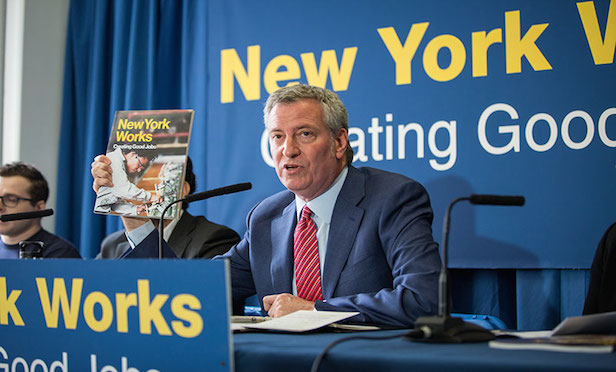
NEW YORK CITY—Mayor Bill de Blasio released on Thursday a “New York Works” 10-year plan to create 100,000 “good paying” jobs to help bolster the city's middle class.
The mayor said the plan will focus on investing in growing sectors that will produce new jobs that pay at least $50,000 a year or offer a path to that salary level.
“We have to take economic inequality head-on, and that means raising wages and launching more New Yorkers into the middle class. These are the fast-growing, high-paying industries that represent the future of our city, but only if we invest now in the places, the workforce and the infrastructure to compete,” said Mayor de Blasio.
The de Blasio administration said it will make significant investments in key sectors such technology, particularly cybersecurity (30,000 new jobs); life sciences and health care (15,000 new jobs); industrial and manufacturing (20,000 new jobs) and the creative and cultural sectors (10,000 new jobs).
The New York Works plan reflects $1.1 billion in currently allocated city spending, and a further $250 million the administration will apply in its November and January updates to the budget.
The mayor also related the city will provide those sectors with physical space to expand, tax incentives, business development investments for early-stage companies and workforce training. He also pointed to the city's effort to spur millions of square feet of new commercial office space (25,000 jobs) through its “Office Anchor” initiative by helping to initiate new commercial building development in the outer boroughs by leveraging city agencies as anchor tenants. An upcoming RFP for commercial development in East New York will include 250,000 square feet sought by the Human Resources Administration.
Among some of the highlights of the New York Works plan include $30-million in city funding for establishing the city as a global hub for cybersecurity, including launching the first accelerator dedicated to early stage cybersecurity firms.
Among some of the initiatives include a program to create a citywide freight network that would create 4,000 good-paying industrial jobs by building more shipping and distribution infrastructure. The plan calls for doubling the number of CUNY's computer science graduates to 2,000 per year within five years by investing in faculty, internships and work/study programs, and improved career advising; investing $5 million for the city's first Digital Health Lab and another $6 million for the nation's first “Augmented and Virtual Reality Lab.”

The mayor said the plan will focus on investing in growing sectors that will produce new jobs that pay at least $50,000 a year or offer a path to that salary level.
“We have to take economic inequality head-on, and that means raising wages and launching more New Yorkers into the middle class. These are the fast-growing, high-paying industries that represent the future of our city, but only if we invest now in the places, the workforce and the infrastructure to compete,” said Mayor de Blasio.
The de Blasio administration said it will make significant investments in key sectors such technology, particularly cybersecurity (30,000 new jobs); life sciences and health care (15,000 new jobs); industrial and manufacturing (20,000 new jobs) and the creative and cultural sectors (10,000 new jobs).
The
The mayor also related the city will provide those sectors with physical space to expand, tax incentives, business development investments for early-stage companies and workforce training. He also pointed to the city's effort to spur millions of square feet of new commercial office space (25,000 jobs) through its “Office Anchor” initiative by helping to initiate new commercial building development in the outer boroughs by leveraging city agencies as anchor tenants. An upcoming RFP for commercial development in East
Among some of the highlights of the
Among some of the initiatives include a program to create a citywide freight network that would create 4,000 good-paying industrial jobs by building more shipping and distribution infrastructure. The plan calls for doubling the number of CUNY's computer science graduates to 2,000 per year within five years by investing in faculty, internships and work/study programs, and improved career advising; investing $5 million for the city's first Digital Health Lab and another $6 million for the nation's first “Augmented and Virtual Reality Lab.”
© 2025 ALM Global, LLC, All Rights Reserved. Request academic re-use from www.copyright.com. All other uses, submit a request to [email protected]. For more information visit Asset & Logo Licensing.








